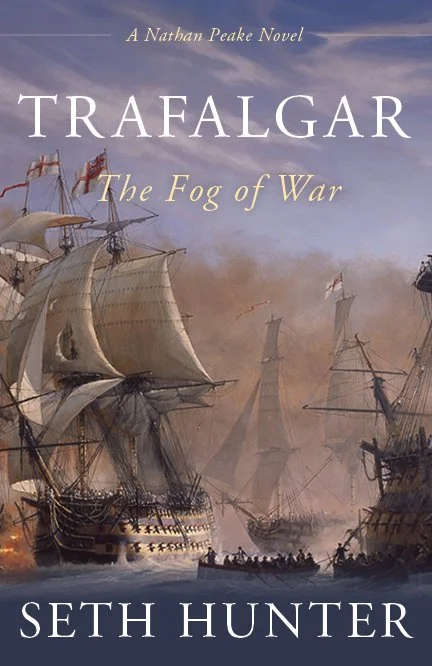Spotlight: Trafalgar: The Fog of War by Seth Hunter
/“All I need is three days of fog,” Napoleon told his admirals, and they would have his greatest enemy at their mercy and the world at his feet.
Based on the writer’s factual research for the Channel Four epic ‘Nelson’s Trafalgar’, this is the story not only of the battle itself but of the extraordinary events that preceded it.
The story begins with the involvement of a British sloop of war, crewed largely by Liverpool seafarers, to land royalist agents on the coast of Normandy, charged with the kidnap, or assassination, of Napoleon Bonaparte – a black op directed by the former Prime Minister William Pitt which was a prime cause of what we now call the Napoleonic Wars.
Excerpt
TRAFALGAR
A Nathan Peake story
Prologue: Step by step
It was his recurring nightmare when he was in the prison in Paris. Being on the wrong side in a battle. The wrong flags, the wrong songs, the wrong uniforms.
He saw them through an arc of fire as he sharpened the blades on the spinning stone. The blue-coated soldiers of the French Army marching up and down the decks, to the sound of fife and drum. Rantan-a-tan-rantan. Rantan-a-tan-rantan… The French call to arms – La Génèrale.
He could hear I repeated across the water on the other ships, the long, rambling forest of oak and pine stretching over several miles of ocean, and the rumble and squeak of iron on wood as they rolled out the guns. He looked across at Mr Banjo on the neighbouring grindstone and shook his head. ‘How did we get here?’
Allons enfants de la Patrie,
Le jour de gloire est arrivé!
He remembered the first time he heard it, in Paris during the Terror, just before they had tried to string him up from a lamppost. Death as close then as it was now, perhaps even closer. He’d had his flute with him, and when they took the rope from around his neck, they gave it back to him and he played them a tune - Yankee Doodle, because they thought he was an American then, too. As they did now.
Yankee Doodle keep it up, Yankee Doodle dandy,
Mind the music and the step, and with the girls be handy.
He supposed that was where it had begun. Paris at the time of the Terror. The danger and the deceit, the seductive lure of living with both, and the fear. But it could have been earlier, keeping watch for the smugglers on the hills above the Cuckmere.
‘You should be ashamed of yourself, boy, and your father a magistrate.’
Another memory. Of his mother and father having one of their furious rows when he was a child – about him, their lives together, their incompatible politics… or all three? His father with his head in his hands plaintively asking: ‘How did we get here?’ And his mother’s grim reply: ‘Step by step’.
They say your whole life flashes before you when you are drowning.
‘To dangerous liaisons, sir. Where would we be without them?’
That would be Sir Sidney Smith in the Ship Inn at Falmouth. Mephistopheles to his bemused Faust, flushed and jolly over a bowl of punch, with the snow on the hills and the wind from the north-east filled with chips of ice, like the splintered bones of dead armies.
‘Oh, we are going to kidnap Bonaparte, did I not tell you?’
Well, we know how that ended. For some, at least. And now here he was, sharpening blades for the emperor’s soldiers so they could conquer Britain.
‘Three days of fog, that is all we need, and England will be ours.’
That would be the emperor himself, in the rose garden at Malmaison. Three days of fog. Not a lot to ask for in the English Channel in October.
No fog here, though. Clear blue skies, perfect weather for a battle – if only there was a bit more wind. He looked out across the deck, out to sea through the sparks of the spinning wheel and saw the English ships in the distance bearing down on them. More creeping than bearing, perhaps, so painfully slow, even under a full press of sail. There would be singing there, too.
Heart of Oak are our ships,
Jolly Tars are our men,
We always are ready:
Steady, boys, Steady!
He should be singing with them. Not here, sharpening swords for the enemy.
‘Merci, monsieur.’
‘Mon Plaisir, monsieur.’
Now they were lining up to climb into the rigging. The grenadiers and the sharpshooters, the voltigeurs and tirailleurs. All those weeks of training in Cadiz, throwing their grenadoes and firepots, shooting at the cutouts of the officers at the taffrail.
And there was the sergeant from Naples, waiting his turn. Antonio Scillato. The man they called Lo Spettro, the ghost, the revenant. The man who was already dead.
Nathan watched him climbing the ratlines into the fighting tops with his musket slung by a strap at his shoulder. Hand over hand. Step by step.
Buy on Amazon | Bookshop.org
About the Author
Seth Hunter is the pen name of British writer Paul Bryers, the author of the Nathan Peake series of naval adventures set against the canvas of the French Revolution and Napoleonic Wars. Bryers was born in Liverpool and attended Quarry Bank school before taking a degree in modern history, politics and economics at Southampton University and then embarking on a career as a journalist for the Daily Mirror, a television reporter and then a writer, producer and director of many television dramas and documentaries. He has won an English Arts Council award for Best First Novel, an outstanding achievement award at the New York Film Festival for his PBS series ‘Queen Victoria’s Empire’ and has been nominated for Bafta and Grierson awards for docudramas such as The Line in the BBC2 series ‘Seven Wonders of the Industrial World’ and Channel Four’s Nelson’s Trafalgar.















































